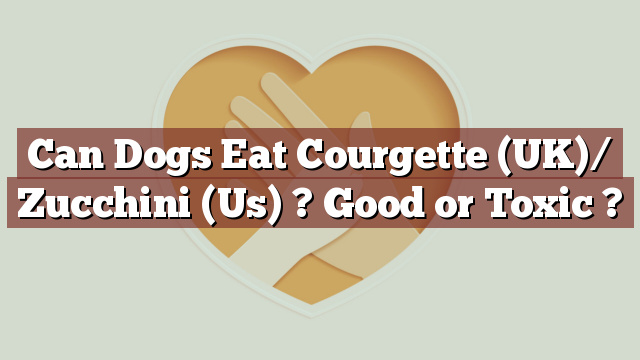Can Dogs Eat Courgette (UK)/ Zucchini (US)? Good or Toxic?
As responsible pet owners, it’s crucial to be aware of what foods are safe for our furry friends to consume. While dogs have different dietary needs than humans, it’s natural to wonder if certain fruits and vegetables, like courgette (UK) or zucchini (US), can be included in their diet. In this article, we will explore the nutritional value of courgette/zucchini, discuss whether they are safe or toxic for dogs, analyze potential risks or benefits, and provide guidance on what to do if your dog consumes this vegetable.
Nutritional Value of Courgette/Zucchini
Courgettes, or zucchinis, are low-calorie vegetables that are rich in essential vitamins and minerals. They are a great source of dietary fiber, which aids in digestion and promotes bowel regularity. Additionally, courgettes/zucchinis contain significant amounts of vitamin C, vitamin A, and potassium. These nutrients contribute to a healthy immune system and support the overall well-being of dogs.
Is Courgette/Zucchini Safe or Toxic for Dogs?
Yes, dogs can safely consume courgette/zucchini. In fact, this vegetable can be a healthy addition to their diet when served in moderation. However, it’s important to note that dogs have different digestive systems than humans, and their nutritional needs may vary. While courgettes/zucchinis are generally safe for dogs, it is crucial to prepare them properly and avoid adding any harmful ingredients such as onions or garlic.
Potential Risks or Benefits of Dogs Eating Courgette/Zucchini
When served in appropriate portions, courgette/zucchini can offer several benefits to dogs. The high fiber content aids in digestion and can help prevent constipation. The vitamins and minerals found in courgettes/zucchinis contribute to a strong immune system and promote optimal health. Furthermore, the low-calorie nature of this vegetable makes it a suitable option for dogs that require weight management.
However, it’s important to be cautious when introducing new foods into your dog’s diet. Some dogs may experience gastrointestinal upset, such as diarrhea or vomiting, if they consume courgette/zucchini in large quantities. Additionally, if your dog has any underlying health conditions or is on a specific diet, it’s advisable to consult with your veterinarian before making any changes to their diet.
What to Do If Your Dog Eats Courgette/Zucchini
If your dog accidentally consumes courgette/zucchini, there is generally no cause for concern. However, if your dog shows any signs of gastrointestinal distress, such as vomiting or diarrhea, it’s essential to monitor them closely. If these symptoms persist or worsen, it is recommended to seek veterinary advice. Additionally, if your dog has ingested a large amount of courgette/zucchini or has a known sensitivity to this vegetable, it is best to consult with a veterinarian to ensure their well-being.
Conclusion: Courgette/Zucchini Can Be Safe and Beneficial for Dogs
In conclusion, dogs can safely consume courgette/zucchini, as long as it is prepared correctly and given in appropriate portions. This vegetable offers various nutritional benefits, including essential vitamins, minerals, and dietary fiber. However, it’s crucial to introduce new foods slowly and monitor your dog for any adverse reactions. If you have any concerns about your dog’s diet or their reaction to courgette/zucchini, it’s always best to consult with a veterinarian who can provide specific guidance based on your dog’s individual needs.
Thank you for investing your time in exploring [page_title] on Can-Eat.org. Our goal is to provide readers like you with thorough and reliable information about various dietary topics. Each article, including [page_title], stems from diligent research and a passion for understanding the nuances of our food choices. We believe that knowledge is a vital step towards making informed and healthy decisions. However, while "[page_title]" sheds light on its specific topic, it's crucial to remember that everyone's body reacts differently to foods and dietary changes. What might be beneficial for one person could have different effects on another. Before you consider integrating suggestions or insights from "[page_title]" into your diet, it's always wise to consult with a nutritionist or healthcare professional. Their specialized knowledge ensures that you're making choices best suited to your individual health needs. As you navigate [page_title], be mindful of potential allergies, intolerances, or unique dietary requirements you may have. No singular article can capture the vast diversity of human health, and individualized guidance is invaluable. The content provided in [page_title] serves as a general guide. It is not, by any means, a substitute for personalized medical or nutritional advice. Your health should always be the top priority, and professional guidance is the best path forward. In your journey towards a balanced and nutritious lifestyle, we hope that [page_title] serves as a helpful stepping stone. Remember, informed decisions lead to healthier outcomes. Thank you for trusting Can-Eat.org. Continue exploring, learning, and prioritizing your health. Cheers to a well-informed and healthier future!

